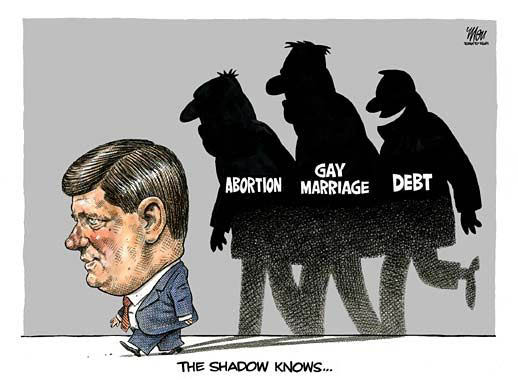 |
|
|
Well, here it is, Day 19 of the campaign, less than three weeks to go before Election Day, as the regressive Conservatives continue to climb in the polls and the bottom drops out of the Liberal and NDP campaigns, and all is not well in the world of Canadian politics. Is there an Anybody-But-Harper coalition forming in Canada? Will the NDP vote almost completely collapse and switch over to the Liberals in the week prior to June 28th? Or, are we on the verge of a Bush-style Americanization of Canadian politics, unprecedented in our lifetime?
We’ll know the answers to the questions posed above in the days to come.
Left-of-Centre Organizations Revise Plans
According to an article written by Simon Tuck and James Rusk, and published in the Globe and Mail …
Left-of-centre groups are now scrambling to overhaul their plans for the federal election campaign, homing in on the possibility of a Conservative win — and warning what a Stephen Harper government may mean for their groups’ issues.
Environmentalists, women’s groups, unions and nationalists say they spent much of the past few months preparing election strategies that revolved largely around trying to influence Liberal policy. With recent public opinion polls showing that the Conservatives may well form the next government, the backlash has included a dramatic shift in these groups’ lobbying efforts.
Elizabeth May, executive director of the Sierra Club of Canada, has said her group’s priority is now making sure voters know that Mr. Harper is the only federal party leader who opposes Canada’s Kyoto Protocol pledge.
In Toronto, a group of constitutional lawyers warned that the Conservatives are planning to override the Canadian Constitution and its protection for minority rights.
“We’re well into this campaign and no one has seen to focus on the content of his policies as it affects the law,” said Clayton Ruby, one of 17 prominent lawyers who signed an open letter last week challenging Mr. Harper’s position on abortion and the Charter of Rights and Freedoms. “These programmes undermine the Constitution, and people should know that when they are making their choices.”
Vancouver mayor Larry Campbell supports an Anybody-But-Harper drive.
“I mean we’re talking traditional right-wing government. That’s the barbarians at the gate. It’s unthinkable that we would go back. I mean he wants to take us back to the 50s.”
Meanwhile, the Liberals have released an aggressive shock ad that they hope will jolt moderate voters, especially women, away from the Tories.
The startling ad (Windows Media Player required) shows a gun barrel which seems to brush the camera lens before going off. A female narrator’s voice sombrely reminds viewers of the Conservative position on a range of issues, positions that would concern any reasonable voter: Harper would have sent troops to Iraq, would weaken gun control, reopen the abortion debate, and scrap the Kyoto accord on greenhouse gas emissions.
Other jarring images include:
- Soldiers with machine guns running across a desert, surrounded by tanks.
- Pregnant young women weeping against a hospital wall.
- Smokestacks spewing noxious fumes.
The ad closes with a Maple Leaf flag dissolving against a Tory-blue sky and a warning that Canada would become unrecognizable under Harper.
Then there are the Liberals’ more traditional, low-key (and seemingly ineffective), non-attack ads, first on their recently-announced childcare proposal; on Canada’s tax system and the programmes to which our taxes are applied; and, the Liberal Party’s position on the environment.
The Canada that Paul Martin enunciates in the ads directly above is the Canada that VanRamblings chooses, and in coalition with an NDP caucus to ensure that a Martin government would fulfill its promises, VanRamblings hopes that this is the Canada you would choose.
The Editorial Illustration of the Day

Next up, VanRamblings’ Quote of the Day …
“We need to recognize that a government that denies a gay man the right to bridal registry is a fascist regime.” Margaret Cho on gay marriage
Stephen Harper’s justice critic — and probable Justice minister in a Conservative government — suggested in a letter written and distributed shortly before the election campaign began that a Conservative government would move as early as this fall to repeal or substantially alter a law that protects gays and lesbians from hate crimes.
“Your efforts and dedication to stop this bill from becoming law have been appreciated and have helped to prepare the groundwork for the repeal or substantive amendment of this bill in the next session of Parliament after the election,” MP Vic Toews wrote three weeks before the campaign began.
Unbowed by attacks against his party’s socially regressive bent, Harper has vowed to change the law granting homosexuals protection from hate crimes to better protect “freedom of expression and freedom of religion.”
In spite of Harper’s declaration above, the Conservatives continue in their so-far-successful attempt to run a saran-wrap campaign, advising the party’s 308 candidates to stick to the election platform and avoid providing fodder for Liberal and NDP broadsides over social policy issues.
Even so, let us hope that the Conservatives cannot continue to keep their social agenda of intolerance from the ears, eyes and hearts of Canadians. There is much at stake in Decision Canada 2004.
For insight into Stephen Harper’s policies, as well as important 2004 federal election news events, click on VanRamblings’ full Decision Canada coverage.
